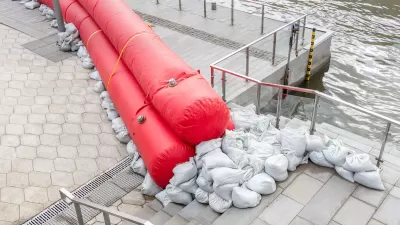Some Midwest cities' plans to upgrade decades-old sewer systems rely on outdated rainfall predictions as flood risks grow due to climate change and shifting weather patterns.

Experts warn that the wastewater system upgrades planned by some cities are 'already obsolete,' writes Diana Kruzman for Grist. "The designs are based on decades-old rainfall estimates that do not reflect current – let alone future – climate risk."
"As of 2004, more than 700 communities around the U.S. had combined sewer systems, where wastewater and stormwater flow through the same pipes." But the plans made by cities to modernize the systems won't hold up to future heavy rains. "In the decades since cities’ plans were first approved, storms in the Midwest have grown more frequent and intense. Total annual precipitation in the Great Lakes region has increased by 14 percent, according to research from scientists at the University of Michigan, and the amount of rainfall from the heaviest storms has grown by 35 percent."
The article details the city of Cleveland's Project Clean Lake, an initiative geared toward overhauling the city's water system that was launched in 1994 and continues to rely on 1990s data. "Despite these changes, [program manager for the Northeast Ohio Regional Sewer District Doug] Lopata said the sewer district isn’t planning to change the structure or design of Project Clean Lake, which aims to capture 98 percent of the water that would otherwise result in sewage overflows."
"Without significant federal aid, the costs of dealing with sewage-laced flooding are passed on to ratepayers, many of whom can’t afford to pay higher water bills in the first place. The price of water in cities like Cleveland and Chicago has more than doubled over the last decade, according to an investigation by APM Reports." Meanwhile, low-income communities face the biggest threats from outdated and unsafe infrastructure.
FULL STORY: Cities are investing billions in new sewage systems. They’re already obsolete.

Planetizen Federal Action Tracker
A weekly monitor of how Trump’s orders and actions are impacting planners and planning in America.

The Simple Legislative Tool Transforming Vacant Downtowns
In California, Michigan and Georgia, an easy win is bringing dollars — and delight — back to city centers.

San Francisco's School District Spent $105M To Build Affordable Housing for Teachers — And That's Just the Beginning
SFUSD joins a growing list of school districts using their land holdings to address housing affordability challenges faced by their own employees.

In More Metros Than You’d Think, Suburbs are Now More Expensive Than the City
If you're moving to the burbs to save on square footage, data shows you should think again.

The States Losing Rural Delivery Rooms at an Alarming Pace
In some states, as few as 9% of rural hospitals still deliver babies. As a result, rising pre-term births, no adequate pre-term care and "harrowing" close calls are a growing reality.

The Small South Asian Republic Going all in on EVs
Thanks to one simple policy change less than five years ago, 65% of new cars in this Himalayan country are now electric.
Urban Design for Planners 1: Software Tools
This six-course series explores essential urban design concepts using open source software and equips planners with the tools they need to participate fully in the urban design process.
Planning for Universal Design
Learn the tools for implementing Universal Design in planning regulations.
Smith Gee Studio
City of Charlotte
City of Camden Redevelopment Agency
City of Astoria
Transportation Research & Education Center (TREC) at Portland State University
US High Speed Rail Association
City of Camden Redevelopment Agency
Municipality of Princeton (NJ)





























